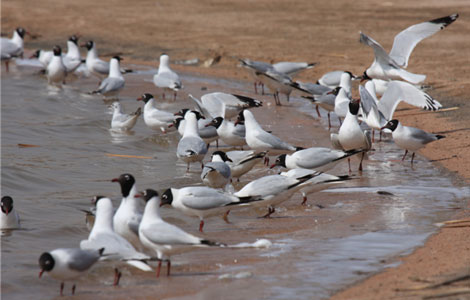Warming to the idea of Arctic exploration
Updated: 2013-05-13 00:26
By ZHOU SIYU in Oslo (China Daily)
|
|||||||||||
Snow dragon coming
The opening up of the Arctic is also sparking widespread interest, reshaping the global geopolitical landscape. Currently the region is governed by the United Nations Law of the Sea Convention, which provides the basic legal framework for marine activities in the Arctic.
The Arctic Council, founded in 1996, is a regional soft-law institution alongside the legally binding mechanism. Consisting of the eight states with territory within the Arctic Circle (namely, the United States, Canada, Denmark, Finland, Iceland, Norway, Russia and Sweden), the council has demonstrated ambitions to become a high-level forum that could be involved in a wide range of circumpolar matters and has achieved increasing influence in recent years. In February, it set up a permanent secretariat in the Norwegian city Tromso.
China, along with many other non-Arctic states, has applied for permanent observer status at the Arctic Council. This year's ministerial meeting, to be held on May 15, is expected to deliver a decision on China's application.
With rising economic power and international influence, every movement China takes attracts attention from the international community. The country is currently an ad hoc observer at the council, which means it has to apply to attend each meeting held by the council.
In terms of influence on the decision-making process in the council's ministerial meetings, a permanent observer status is no different from that of an ad hoc observer. Yet many critics believe this move signals China's increasing interest in the Arctic region and that it is trying to boost its clout within the club.
Facts suggest that China's growing interest in the Arctic region are mainly economical. And that can only serve to enhance commercial ties between the Asian country and Arctic states, rather than creating conflicts and confrontation.
Russia is arguably the most influential player among the Arctic states, possessing at least half of the land area in the region. Although there is no evidence showing that China is improving ties with Russia purely out of interest in the Arctic, it certainly plays a part.
During Chinese President Xi Jinping's first official trip abroad - to Moscow - Russia and China signed a number of agreements. By dint of this opportunity, the State-owned oil giant China National Petroleum Corp signed an agreement with its Russian counterpart Rosneft to cooperate in the Russian Arctic regions.
On April 16, China signed a free trade agreement with Iceland and state heads from the two countries reaffirmed future cooperation in the Arctic region. Trade volume between the two countries in 2012 jumped 21 percent from a year earlier to a total of $180 million. The growth is expected to continue.
Another reason for the Arctic not yet featuring an important position in China's foreign policy is that the country's research into the region may not be comprehensive enough to support greater interest. To date, Arctic research in China has focused on the environmental and climatic consequences caused by the melting ice.
Although in recent years there has been an increasing number of researchers looking into the economic and political implications, it still takes time for their work to influence policy-makers' decisions. The Chinese government has yet to voice an official position regarding the Arctic region.
"Chinese researchers need to take a more comprehensive approach in their studies of the Arctic," said Yang from the Polar Research Institute of China.
At the same time, the fact that China is more interested in the Antarctic should also encourage Arctic states to relax. Economically speaking, the unregulated Antarctic appears much more rewarding. In comparison, the Arctic is a highly regulated region, with more than 80 percent of the resources under national jurisdiction and the coastal states have exclusive jurisdiction over exploration.
Even scientific expeditions prioritize the Antarctic. China recently announced plans to construct two new stations there, in addition to the existing three. The country is also trying to build a new expedition research icebreaker vessel in addition to Xuelong (Snow Dragon), which traversed the Arctic for the country's fifth North Pole expedition.
The new vessel, designed mainly by foreign companies and built in China, and expected to be operational in 2014, will adopt technical requirements for Antarctic expeditions in front of those for the Arctic, a person close to the matter told China Daily.
"There is a saying among us: The new vessel will reach wherever it can in the Arctic and wherever we want to in the Antarctic," he said, speaking under the condition of anonymity.
A dragon in the awakening can be unnerving but, for the Arctic states, it may take a while before its fiery breath is felt. The Arctic Council
Formally established on Sept 19, 1996, by the Declaration on the Establishment of the Arctic Council (Ottawa Declaration), the Arctic Council is a high-level intergovernmental forum that sets out to promote cooperation and coordination among circumpolar states over issues such as sustainable development and environmental protection in the Arctic. The council's main decision-making mechanism is a bi-annual ministerial meeting.
The Arctic Council currently includes eight member states: Canada, Denmark (including Greenland and the Faroe Islands), Finland, Iceland, Norway, the Russian Federation, Sweden and the United States.
Six non-Arctic countries have been admitted as observers to the Arctic Council: France, Germany, the Netherlands, Poland, Spain and the United Kingdom.
There are three ad hoc non-Arctic observer states in the council, including China. Ad hoc observers have to apply to be admitted to attend Arctic Council meetings. But in term of influence on the decision-making process in the council's ministerial meetings, a permanent observer status is no different from an ad hoc observer. Only Arctic Council member states have voting rights.
Related Stories
China contributes to development of Arctic 2013-03-25 22:02
Arctic shipping lanes open up 2013-03-14 07:43
China's cold winter linked to Arctic sea ice loss 2012-12-28 20:35
China's arctic pioneers begin work 2012-08-31 11:15
China to open int'l institute for Arctic studies 2012-08-18 20:53
Alien-like marine life in Arctic Ocean 2012-07-18 14:32
Today's Top News
Taiwan dispatches fleet to protect fishing boats
Deputy head of top economic planner probed
China, ASEAN to strengthen mining cooperation
Taiwan demands Filipino response
Moving overseas a remedy for nurses
Death toll rises in Sichuan coal mine explosion
Disclosure delays help fuel online rumors
Warming to Arctic exploration idea
Hot Topics
Lunar probe , China growth forecasts, Emission rules get tougher, China seen through 'colored lens', International board,
Editor's Picks

|

|

|

|

|

|





